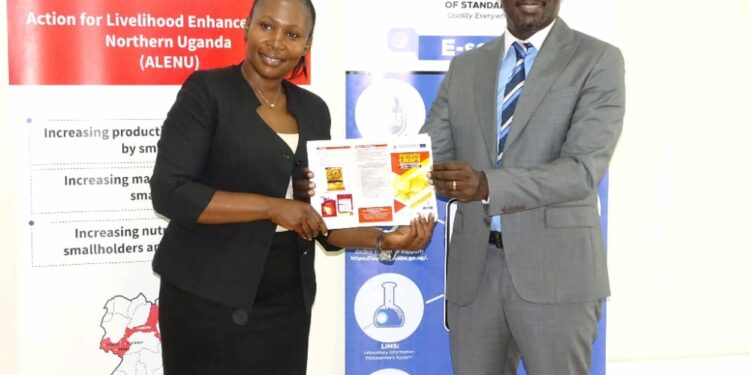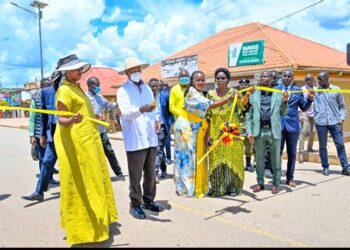Uganda National Bureau of Standards (UNBS) on Thursday launched a campaign in Northern Uganda to translate food standard guidelines for easy-usage.
This intervention is being implemented by translating these food standards and guidelines into local languages (Alur and Acholi) which locals can easily digest.
The campaign was launched in close collaboration with Advance Afrika under the Action for Livelihood Enhancement in Northern Uganda (ALENU) Project, in order to ease the uptake and implementation of these standards and guidelines by Micro Small and Medium Enterprises (MSMEs).
The easy-to-use awareness materials were crafted from 22 standards that include; specifications for food items in fields of apiary, local poultry, beans, soya beans, tomatoes, onions, groundnuts, freshware potatoes, moringa and vegetables.
These, in addition to code of practice for sanitation and hygiene have been translated to Acholi and Alur languages, which are widely spoken and understood by almost all locals.
While speaking at the launch of this campaign, Andrew Othieno, the Manager Standards at UNBS said it is relevant to break down these guidelines/standards and write them in a language that is easily understood by the locals. He noted that it will breed widespread compliance.
“Standards are technical documents. For them to be well understood, it is important that we simplify them by writing them in a language that is easily understood to ease their uptake and implementation. That way, the benefits are realised by the users,” said Othieno.
Locals from six districts of Agago, Amuru and Omoro in Acholi sub- region, Nebbi, Pakwach and Zombo in West Nile sub-region were targeted, with a prime aim of improving livelihoods through increased and diversified food production, enhanced market access oppportunties and better maternal and child nutrition.
Innocent Sheila, the Director for Finance and Administration at Advance Afrika said not only was the intervention aimed at simplifying food standards, but also educating farmers in the above districts on how these guidelines can be applied to ensure that products on market meet quality standards set by UNBS.
“In addition to simplifying and translating the food standards, we are going to train farmers in the selected districts on how to use them, because products must meet the standards to access markets,” said Sheila.
Akera Dophline, MEL Officer at CARITAS said the intervention is tailored towards replenishing productivity, marketing, health and nutrition in Acholi and West Nile sub-regions, major focus being farmers groups after which it will permeate different households.
“The ALENU project started in 2020 and will conclude in April 2023. This intervention is focusing on production, marketing, health and nutrition for 200 farmer groups which translates to 5000 households, with each house hold having an average of 7 beneficiaries,” said Adolphine.
Note should be taken that the ALENU project which is funded by the European Union and supervised by the Office of the Prime Minister (OPM) is valued at 4.3M Euros, and tailored towards improving livelihoods of more than 35,000 people.
It is also aimed at consolidating stability in Northern Uganda, eradicate poverty and under-nutrition in addition to strengthening grounds for sustainability and inclusivity in the drive to achieve socio-economic transformation.
Do you have a story in your community or an opinion to share with us: Email us at editorial@watchdoguganda.com













